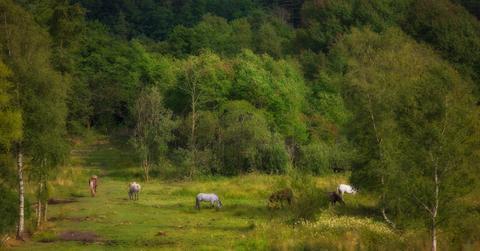Exploring the Positive Impacts Organic Farming Has on Biodiversity
Published Dec. 24 2020, 2:00 p.m. ET

Humans have been farming almost since the very beginning of civilization. As civilization grew and the population continued to grow with it, these farms became even more essential to the perpetuation of the species. Unfortunately, our species’ unchecked growth has wreaked havoc on the natural world. Biodiversity, the variety, and the variability of life on Earth have been adversely impacted by many aspects of civilization, but commercial farming is one of the most egregious. On the other hand, organic farming has had a positive effect on biodiversity

What kind of positive impact does organic farming have on biodiversity?
Research from the Universities of Leeds and York has recently revealed that biodiversity on organic farms is far greater than it is on conventional farms. Among the evidence cited in the paper, the researchers have seen an overall 12 percent increase in biodiversity. Organic farms were found to have more plant diversity and greater floral diversity, as well as more earthworms, insects, butterflies, and even increased numbers of some types of birds.
What this means is that organic farms are better equipped to keep their environmental impact lower than that of commercial farms. This has to do with the practices involved in organic farming and the environmentally-conscious methodologies that render their agricultural process so much more eco-friendly.
The same is true for organic and regenerative animal farming, which, in some cases, allows for the free range of domesticated animals. By allowing their animals to range and become part of the surrounding environment, organic farmers are able to utilize the natural grazing behaviors and fertilization, erm, methods of the animals they raise. Nature is still being contained, but it is also being allowed to flourish in a more natural way than on non-organic animal farms and factory farms.

What practices within organic farming have a positive impact on biodiversity?
There's a reason that the bees and bugs and birds thrive so well in and around organic farms. The main reason for this is the lack of chemical pesticides. Pesticides like Roundup are cancer-causing chemical concoctions that not only harm the insects that try to take a small share of our crops, but they also cause harm to the humans that rely on those crops for survival. These chemicals, in particular, wreak havoc on bee populations, which are essential for pollinating plants and crops the world over.
Without these chemicals, crops can still thrive, and eco-friendly methods are undertaken to repel insects rather than annihilate them. More insects mean more birds, who in turn, eat the insects and keep the populations down. This cycle is part of a working degree of biodiversity that human beings have convinced themselves is unnecessary for growing crops. It may be less efficient, but it certainly isn’t detrimental. Although, some folks might think otherwise.

Does organic farming have a positive impact on soil?
Organic farming utilizes soil conservation tactics and practices that help the nutrients and microorganisms thrive. Many organic farms utilize compost, natural fertilizer, and no-till farming practices that eliminate or lessen soil degradation over time. This means that even if organic farming were to require even more land to collect similar yields to commercial farming, it would not need to find new land as often.
So rather than utilizing slash-and-burn farming methodologies that strip whole swaths of land of all nutrients after a few growing seasons, organic farmers are often sensible of the delicate balance of the natural world. They know that earthworms help maintain soil, and that insect and bird waste can help it remain arable. It is a type of conservation, which in turn helps build or rebuild biodiversity amongst the creatures that live there.

What do critics say about organic farming?
Despite the evidence of its successes in terms of biodiversity, there are naysayers out there that believe that organic farming’s positive impact is little more than the fluke result of a “hippie-dippie” practice that is not aware of how insignificant it really is. Several experts, including Professor Tim Benton, who was a lead researcher on the Leeds project, have drawn less than stellar conclusions about the prospect of increased organic farming.
Prof. Benton states that while organic farms may be seen as wildlife-friendly, but the benefits to birds, bees, and butterflies do not compensate for the lower yields produced. He goes on to conclude that to produce the same amount of organic food as those produced by conventional means, you would need to use twice the amount of land for agriculture. It means that organic farming, while more environmentally-friendly in the long run, still has a significant environmental impact on the planet.
Organic farming may not be the catch-all solution to our environmental problems, but it’s certainly helpful in returning the world to a state of balance. Our growing population and the demands upon our overall yields of crops will continue to necessitate more streamlined and effective farming processes, but that does not preclude adopting practices that take care of our environment rather than incrementally stripping it of the very things it needs to survive.